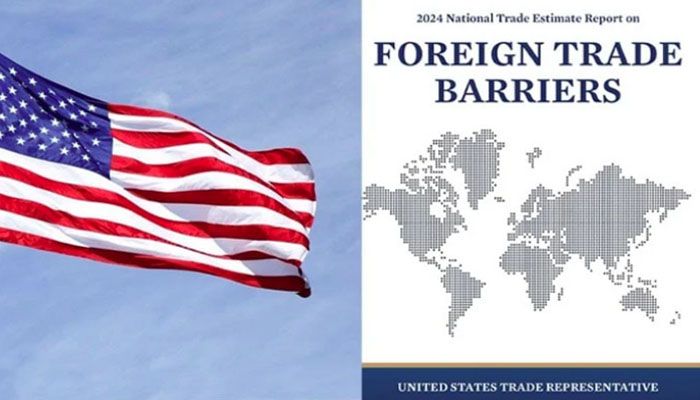
Desk Report
30 March, 2024 20:44
3 foreign trade barriers in Bangladesh, says US report

photo: collected
The United States has published a report mentioning three types of obstacles to investment in Bangladesh—bribery, corruption, and lack of cleanliness.
On Friday (March 29), the Department of Commerce of the country published the report on trade barriers in foreign trade in 2024, highlighting the obstacles to trade and investment in Bangladesh.
In the report, it is said that Bangladesh has not yet informed the World Trade Organization (WTO) about the 'Customs Valuation Legislation'. Bangladesh talks about competitive tender and selection process internationally.
It is further stated that Bangladesh has launched a National Electronic Procurement Portal. However, American stakeholders have expressed concern in various papers about the manipulation of old technical standards in the procurement process. Also, American stakeholders doubt whether the selection of preferred contractors for technical standards involves the use of Bangladeshi stakeholders.
Several American companies have claimed that their foreign competitors in Bangladesh have used Bangladeshi stakeholders to check documents in various tenders for procurement. American companies have accused the Bangladeshi government of secretly selecting contractors in government procurement. The Bangladeshi government is not a signatory to the government procurement agreement or a member of the WTO committee on government procurement.
Although Bangladesh has taken initiatives in recent years for intellectual property protection, the United States is not sure about its effective implementation. The report mentions that counterfeit products are readily available in Bangladesh. American stakeholders allege that consumer goods, clothing, medicine, and software products are counterfeited in Bangladesh.
The United States has mentioned various barriers in the digital commerce sector in Bangladesh. In this regard, the United States has expressed its concerns about various laws recently enacted.
It is stated in the report that the United States and other international investors have raised concerns about corruption in the process of repatriating profits from investment in Bangladesh. Additionally, the report mentions legal complexities in sending remittances from Bangladesh to abroad.
Due to concerns about labor issues, the United States declared Bangladesh ineligible for Generalized System of Preferences (GSP) benefits in 2013. It is mentioned in the report that it is still in effect.
The report states that corruption in Bangladesh is a widespread and long-term problem, and anti-corruption laws are not properly enforced. Despite providing facilities and incentives, bribery and corruption remain common in commercial transactions. American companies have alleged delays in obtaining licenses and approvals due to the desire for bribes from Bangladeshi government officials.
The report mentions the undermining of the independence of the Anti-Corruption Commission (ACC), stating that the government job law enacted in October 2018 says that any government employee must obtain permission from the relevant authority of the ACC before arresting them. At the same time, the power of the ACC to investigate allegations of corruption against government employees has been limited. However, the ACC is currently prosecuting government officials for corruption. However, many cases are going uninvestigated there.







 নির্বাচনের বড় চ্যালেঞ্জ নিরাপত্তা: সিইসি
নির্বাচনের বড় চ্যালেঞ্জ নিরাপত্তা: সিইসি 




 IT Lab Solutions Ltd.
IT Lab Solutions Ltd.
আপনার মন্তব্য